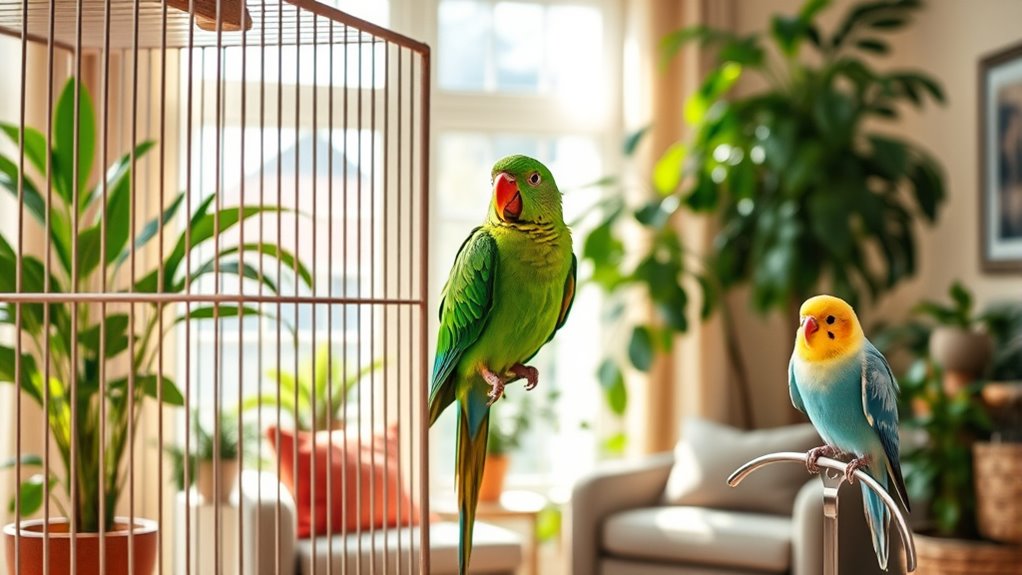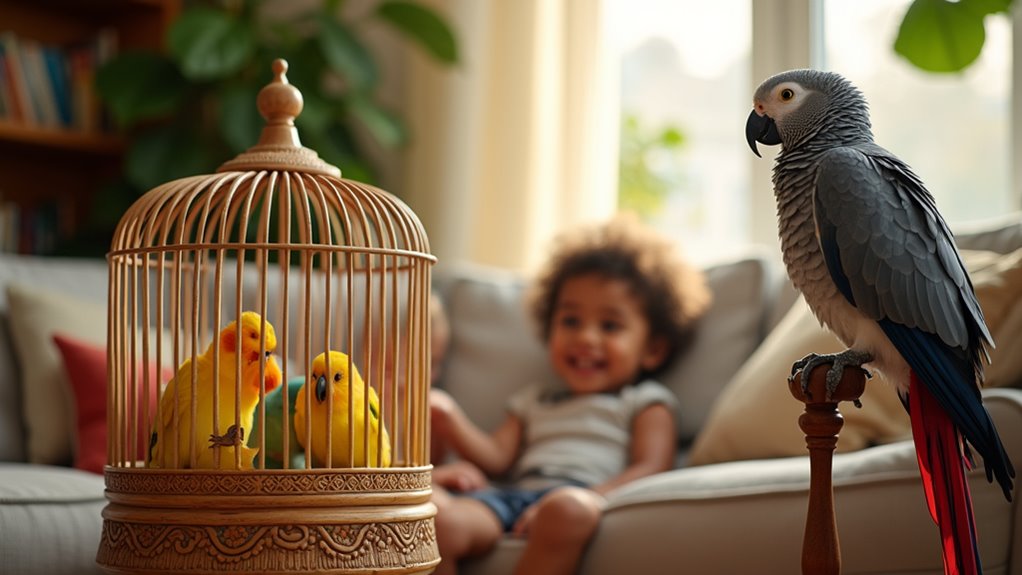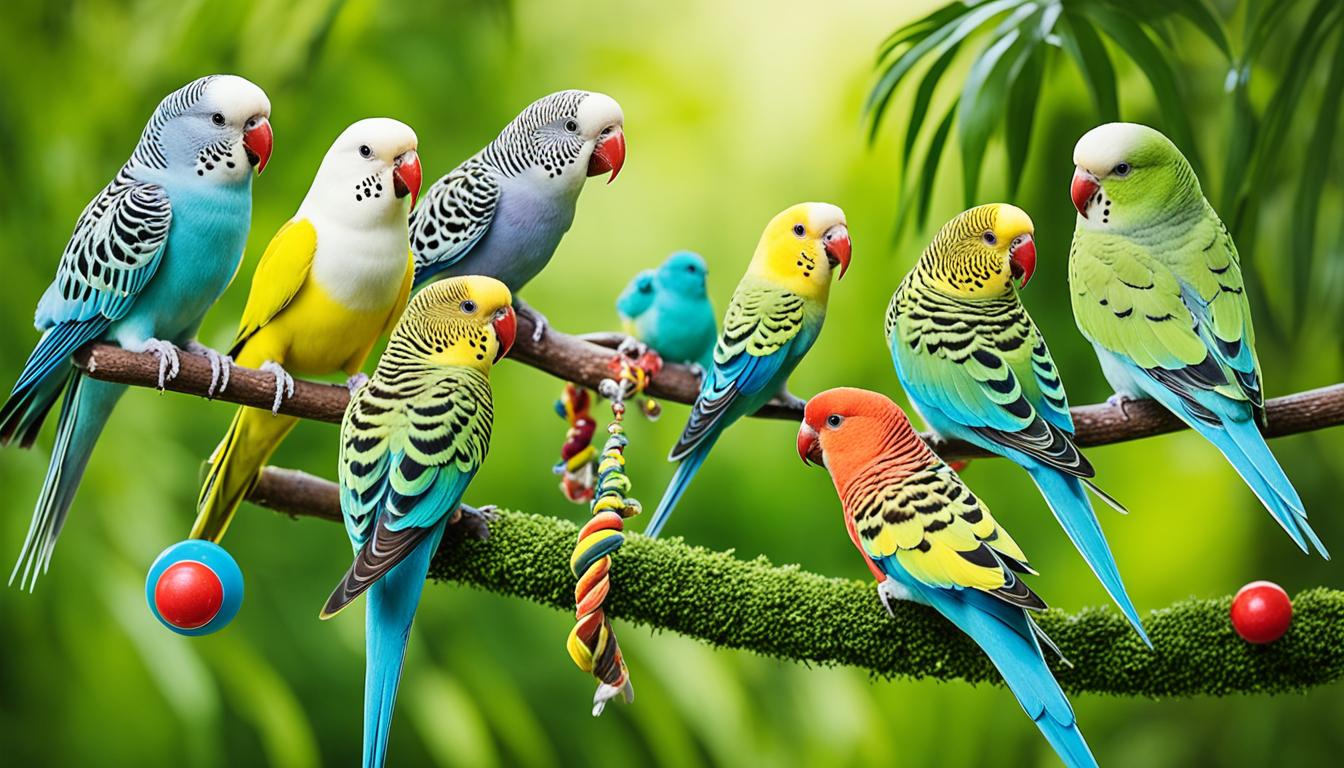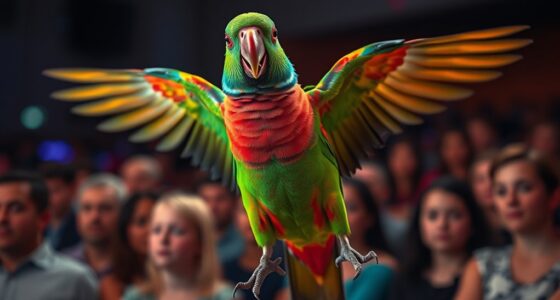When choosing a pet bird, consider your space, lifestyle, and the bird’s needs. Smaller birds like finches or canaries need cages at least 18″x18″ x 24″ high, while larger parrots require bigger enclosures to stay happy and healthy. Think about their diet, including seeds, pellets, and fresh foods, and guarantee fresh water daily. A safe, stimulating environment and proper care help your new feathered friend thrive. Discover more tips to find the perfect match for your family.
Key Takeaways
- Consider your family’s available space; smaller birds like finches need less room than larger parrots.
- Assess your daily routine and activity level to choose a bird with compatible social and care needs.
- Research species-specific diets, cage requirements, and noise levels to ensure a good fit for your household.
- Be aware of each bird’s lifespan and health needs to ensure long-term commitment.
- Select a bird with temperament and energy levels that match your family’s lifestyle and experience.

Are you considering adding a pet bird to your home? If so, you’re making an exciting choice that can bring joy and a splash of color to your everyday routine. But before you bring one home, you need to think about the essentials, starting with the bird’s environment and diet. One of the most important factors is choosing the right bird cage size. A cage that’s too small can cause stress and health problems, while a spacious cage offers your bird room to move, stretch, and express natural behaviors. For small birds like finches or canaries, a cage measuring at least 18 inches long, 18 inches wide, and 24 inches high is a good starting point. Larger parrots require even more space—think cages that are 36 inches or more in width and height. The cage should have plenty of room for perches, toys, and food dishes, and should be easy to clean. Remember, a bigger cage isn’t just about space; it’s about providing a safe, comfortable environment that encourages your bird’s well-being. Additionally, ensuring proper color accuracy in the bird’s environment can help reduce stress and promote a calm atmosphere. Proper ventilation in the cage design is also essential to prevent respiratory issues and maintain a healthy environment for your bird. Good airflow can help reduce moisture buildup and prevent the growth of mold or bacteria that could harm your feathered friend. Incorporating adequate lighting can also support your bird’s natural circadian rhythms and overall health. It is also beneficial to consider the global entertainment industry influence that popular pet birds like parrots have, which can inspire your choice and care routine.
Alongside cage size, understanding bird diet options is essential for their health and happiness. Birds have diverse dietary needs depending on their species, so doing some research beforehand helps you provide the best nutrition. Most pet birds thrive on a balanced mix of seeds, pellets, fresh fruits, and vegetables. Seeds alone aren’t enough—they can be high in fat and lacking in essential nutrients. Pellets are formulated to give a complete diet, making them a good staple. Fresh produce like leafy greens, carrots, apples, and berries add important vitamins and minerals. Avoid feeding your bird chocolate, caffeine, avocado, or salty foods, as these can be toxic. Providing fresh water daily is also essential for their health. Some bird owners incorporate treats like millet sprays or small amounts of cooked grains, but these should be given in moderation. Remember, a varied diet keeps your bird interested and healthy, and it’s a great way to bond with them through feeding.
Choosing the right cage size and understanding your bird’s diet options are the foundation of responsible pet ownership. They directly impact your bird’s health, happiness, and longevity. When you start shopping, look for cages with sturdy bars, secure latches, and plenty of space. Combine this with a nutritious, well-balanced diet, and you’re on your way to providing a safe, stimulating home. Keep in mind that caring for a bird involves ongoing attention to their environment and diet, but the reward is a lively, affectionate companion that brightens your days.
Frequently Asked Questions
What Is the Average Lifespan of Different Pet Bird Species?
You might wonder about bird lifespan and pet bird longevity when choosing a pet. Smaller birds like finches and canaries typically live 5-10 years, while parrots such as African greys and Amazons often reach 40-60 years with proper care. Budgerigars usually live around 7-10 years, and cockatoos can live up to 70 years. Knowing these ranges helps you plan for a long-term commitment and provides the best care for your feathered friend.
Are Pet Birds Suitable for Small Children or Elderly Families?
Pet birds can be suitable for small children or elderly families, but you need to prioritize safety. For children, choose calm, gentle species and supervise interactions to prevent bites or accidents. Elderly care requires birds that are easy to handle and low-maintenance. Always consider child safety and elderly needs, providing a secure environment. With proper care and supervision, pet birds can bring joy to all ages, making them a lovely addition to your family.
How Much Does It Cost to Care for a Pet Bird Annually?
Caring for a pet bird costs around $100 to $300 annually. You’ll need to budget for a healthy bird diet, which includes seeds, pellets, and fresh fruits, plus cage maintenance to keep their environment clean. Regular vet visits are essential too. By managing these expenses, you guarantee your feathered friend stays happy and healthy without breaking the bank.
Can Pet Birds Live Comfortably With Other Household Pets?
Sure, your pet bird might enjoy mingling with household pets—if it’s a social butterfly. But beware: bird socialization isn’t a walk in the park, and household safety is paramount. Cats and dogs often see birds as snacks, not friends. Keep them separated when unsupervised, and make certain your bird’s environment is secure. With proper precautions, your feathered friend can coexist happily, but don’t count on spontaneous bird-pet playdates.
What Are Common Health Issues in Popular Pet Bird Species?
You should be aware of common health issues in popular pet birds like parrots, canaries, and finches. Poor bird nutrition can lead to vitamin deficiencies, while inadequate cage hygiene increases the risk of infections. Regularly cleaning the cage and providing a balanced diet help prevent illnesses. Watch for symptoms like feather plucking, lethargy, or breathing problems, and consult an avian vet promptly to keep your bird healthy and happy.
Conclusion
Choosing the right pet bird is like finding a new friend who’ll brighten your days. Think about your lifestyle, space, and what kind of bird’s personality matches yours. When you pick wisely, you’ll enjoy a bond that’s as uplifting as a songbird’s melody. Remember, a well-chosen bird becomes part of your family, bringing joy and companionship. So, take your time, do your research, and get ready to welcome a feathered friend into your life.









